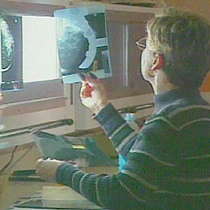2007年VOA标准英语-Study Shows High Fiber Diet Not More Helpful Fi
搜索关注在线英语听力室公众号:tingroom,领取免费英语资料大礼包。
(单词翻译)
By Melinda SmithWashington
18 July 2007
We are going to find out about two studies on breast cancer. One studied whether a diet very high in fiber1 and low in fat could reduce the risk of recurring2 breast cancer. Another study focused on women with a high risk of developing breast cancer to see if their chances of dying from the disease were greater than those with a lower risk of developing breast cancer. VOA's Carol Pearson has more on the results of both studies.
 |
||
"What we've got here is a good example of the bold colors and the strong flavors that we've emphasized in the study," explains John Pierce with the University of California Cancer Center in San Diego. He led an international study involving more than 3,000 breast cancer survivors.
"The study dramatically increased vegetables up to about eight vegetable servings. Part of that was done with vegetable juice. We got three fruit servings and we took energy from fat down to about 24 percent," says Pierce, with the Moores Cancer Center.
Over a period of six years, half the women in the study ate five servings of fruits and vegetables a day and limited their fat intake4 to 30 percent of total calories. The other half ate a diet higher in fiber and lower in fat. The findings? There was no difference between the two groups in recurring breast cancer or living longer.
"You don't need to go ten a day in vegetables and fruits. Five a day is enough," Pierce says. The study was published in the Journal of the American Medical Association.
Another study, this one published in the New England Journal of Medicine looked at women who have a high risk for inherited breast cancer.
All of us have genes6 known as BRCA, but women with a genetic7 mutation8 of this gene5 have a 70 to 90 percent chance of developing breast cancer.
Researchers studied nearly 1800 women with breast cancer. About 10 percent had the high-risk genetic mutations. In both groups more than half the women were still alive 10 years after being diagnosed. What is more, the women with the BRCA mutation responded equally as well to chemotherapy as the women without this genetic risk.
The only thing that can prolong the lives of women with this genetic mutation is to be monitored closely to catch the early signs of cancer and then to be treated appropriately.
 收听单词发音
收听单词发音 




